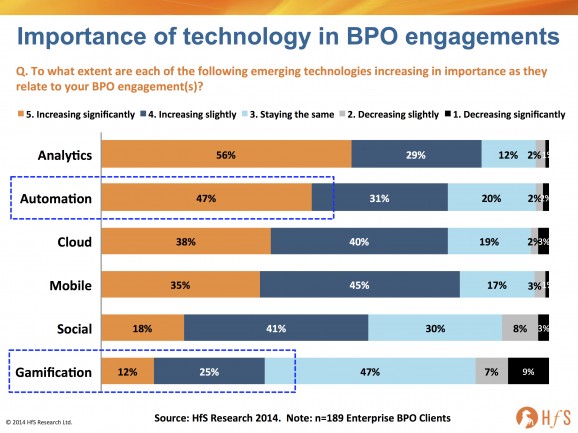“Rewritten by machine and new technology, and now I understand the problems you can see”
Source: “Video Killed the Radio Star” by the Buggles, 1979
Yes, even back in ’79, when a portly Christian Bale wore a hairpiece and the first nudist beach was established in the United Kingdom, the world was already beginning to zone in on the power of automation. Well maybe it wasn’t, but we were trying to find a clever way to connect the Buggles, American Hustle with Automation and BPO… so let’s have HfS’ own automation star, Charles Sutherland, shine some light on this one…
The Stagnation of Gamification
It wasn’t that long ago that in certain circles of the outsourcing market, there was a great deal of excitement about how gamification was a trend which would have a real and meaningful impact on how work was done in delivery centers around the world. Books were written, conferences like GSummit were organized and in general there was an emerging belief that if you made even the most routine work more “fun” organized around mini-games, competitions, points and leaderboards rates of employee engagement and retention would rise and with that overall productivity in the outsourcing market. A full disclosure now, I believed in this at the time and in many respects still due although as I’ll explain, I no longer see this as a wide-sweeping trend and instead as a niche approach for certain roles and workforces now in the future. So while the books still reside on my Kindle, I’m now moving to the belief that at least in the world of BPO and GBS, it won’t be the gamification of roles rather it will be the process automation of roles that will define this world over the next several years.
While it’s true, that gamification may not have made it into the standard discourse in the BPO and GBS marketplace, our recent study of technology trends in BPO suggests that by comparison to process automation and the members of the SMAC stack (Social, Mobility, Analytics and Cloud), Gamification is at best the present, likely the past and certainly not the future technology trend. What has emerged in its place is process automation.
Why and Why Not Gamification in BPO
Gamification was attractive in BPO as a possible solution to some structural challenges in the industry. How do you keep employees engaged and retained when their daily work isn’t always interesting and rarely varies? How do you appeal to new millennial and Gen-Y employees who live in a gamified environment earning “rewards” such as FourSquare badges or posting their Candy Crush Saga conquests on their smartphones when they leave work each day but work on citrixed green screen mainframe claims systems during their days? How do you foster competition between employees to be more productive when you aren’t able to shower them with direct financial rewards? To these problems gamification seemed like the answer. If somehow you could just make the work more “fun” than surely these problems would recede and the benefits would begin to accrue both to service providers and their clients.
Only it’s been hard to gamify enterprise applications or at least the ones that most employees in the BPO marketplace need to use each and every day. Building rewards and badges and point systems and attractive graphical interfaces has taken a back seat to just getting multiple legacy applications to speak to each other and just delivering the process in an effective and efficient manner at a lower cost. It turns out the theory of gamification is great but the business case is much harder to secure for a BPO contract. When it comes to front office staff inside an enterprise there are plenty of examples of successful products like Cognizant’s Motivate to get greater productivity and engagement but that’s a much harder sell inside a BPO especially now that instead of motivating employees in mundane roles to increase productivity you can simply automate out the least exciting, most mundane of work.
You still have attrition in a gamified environment and your BPO employees still get bored with flashy games and competitions as they will always want something new in the same way that people jump to the newest smartphone app or social media tool. An automated process, by contrast, is best when it doesn’t change and the servers processing the work aren’t asking for new screens ever. The business case is also clearer. Develop the process automation flows and then pull in the transactions and then release your employees to engage in other tasks.
The Bottom-line: Why gamify a standard process when you can replace the human element altogether?
To be fair we are still in the early days of the current iteration of process automation applications from the likes of IPSoft, Blue Prism and UIpath to name a few and the BPO reference clients are still pending but the underlying trend seems clear.
So, why invest heavily in gamifying a standard process for your BPO employees when you can replace the human element altogether? It’s for this reason that our surveyed BPO buyers clearly see that there is an increasing importance for process automation going forward, so much so that it has likely now “killed the gamification star” for the future.
Charles Sutherland (pictured right) is author of “Framing a Constitution for Robotistan“, which you can download here.
Posted in : Business Process Outsourcing (BPO), Cloud Computing, HfS Surveys: Technology in BPO 2014, HfSResearch.com Homepage, IT Outsourcing / IT Services, Mobility, Robotic Process Automation, SaaS, PaaS, IaaS and BPaaS, smac-and-big-data, Social Networking, Sourcing Best Practises, sourcing-change, the-industry-speaks










Charles – great piece.
I agree that gamification is not compelling enough in its present form to be that attractive – especially with transactional processes. I see its use being far more widely adopted with front office areas, such as marketing analytics and BI.
Gaurav
Fantastic piece – and loved the picture of Christian Bale!
Which of the BPOs are making significant investments in automation? Do you have examples?
Al.
@Guarav. I agree, gamification still has its uses especially in process areas such as customer care or digital marketing BPO but it’s not the broad solution for improving productivity I once hoped it might be.
@Al. I can’t think of a single significant BPO provider (in the data rather than voice segment) who isn’t looking at process automation today. Some of the providers that have been more public in their advocacy if not investments include TCS and Sutherland Global Services but almost everyone is talking about it now. I’m hoping we see a wave of initial client reference case studies on this in Q3 to give further proof to the behind the scenes investment I am seeing right now
I would like to note in addition to identifying good process automation in BPO and GBS, HfS is also on a quest to identify those tasks, ie “then release your employees to engage in other tasks,” such as change management, analytic-driven consultation, and innovation, that people are uniquely equipped to do and how to best enable those people. That will ultimately differentiate providers and business outcomes as automation can only go so far.
Under-awarded movie, kitschy song, brilliant piece. Christa has a clear vision of the future, I think, when she adds that the human element in BPO should /will turn to change management, analytic-driven consultation, and innovation – tasks that people are uniquely equipped to perform. And for those as-yet-unautomated processors, a migration presumably toward a semi-interesting Game of Drones? Even that “progress” probably awaits cloud-based, born-on-the-web platforms, as Charles implies.
Charles, in my opinion gamification never reached the position where platform based services and process automation have reached within a short span. In fact these two factors will increasingly become a deciding factor in growth of a BPO.
Both IT and BPO service providers will have to invest in building capabilities and offer services based on IP they are creating to continue giving incremental saving to there clients. A strategy that is being adopted by corporations like Genpact, Xchanging and Sutherland Global Services…
My two cents……..
?Mrinal Singh
http://www.linkedin.com/in/mrinalsingha
@Mrinal
You are quite right, gamification didn’t take of in any significant way. I have seen some examples in customer care offerings and a few random examples in data entry and other non-voice processes but as a general rule it was not well understood nor accepted by the leaders of the BPO service providers over the last several years.
Charles
What would be interesting to see is how automation and platform based services disrupt the industry……..
One company that all the Techhelpdesk providers should watch out for is IPsoft, which in my opinion is going to bring a significant shift in the industry.
Mrinal
[…] Horses for Sources Automation killed the gamification star Horses for Sources Develop the process automation flows and then pull in the transactions and then release your employees to engage in other tasks. […]
LinkedIn figured out how to incentivize more user engagement by putting a progress bar on profile completion. Humans respond to visual status displays. Taking this to the next level means finding ways to game up enterprise IT solutions for serious business problems. Game designers should solve market problems. Gaming HR and logistics pays better than playing epic quests. -> http://goo.gl/brBBHs
> it won’t be the gamification of roles rather it will be the process automation of roles that will define this world over the next several years.
I was also one of the herd that drank the gamification kool-aid. While there is still value in specific instances, I absolutely agree that automation of roles is a much better investment over the long run. In the application security industry, the DevOps movement is doing exactly what you describe: automation and management of security roles during the development cycle.
Good article. I hope to see a follow up. — Mark
[…] those interested in a little further reading: http://www.horsesforsources.com/automation-killed-the-gamification-star_030414 Share this:TwitterFacebookGoogleLike this:Like […]
Great Article. I believe automation will get preference in the priority list of a BPO. However with high attrition rates and repetitive nature of job , Gamification does have something to play here . Any latest trends that are seen further?
[…] (Cross-posted @ Horses for Sources) […]